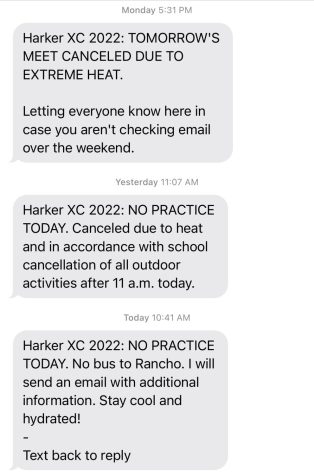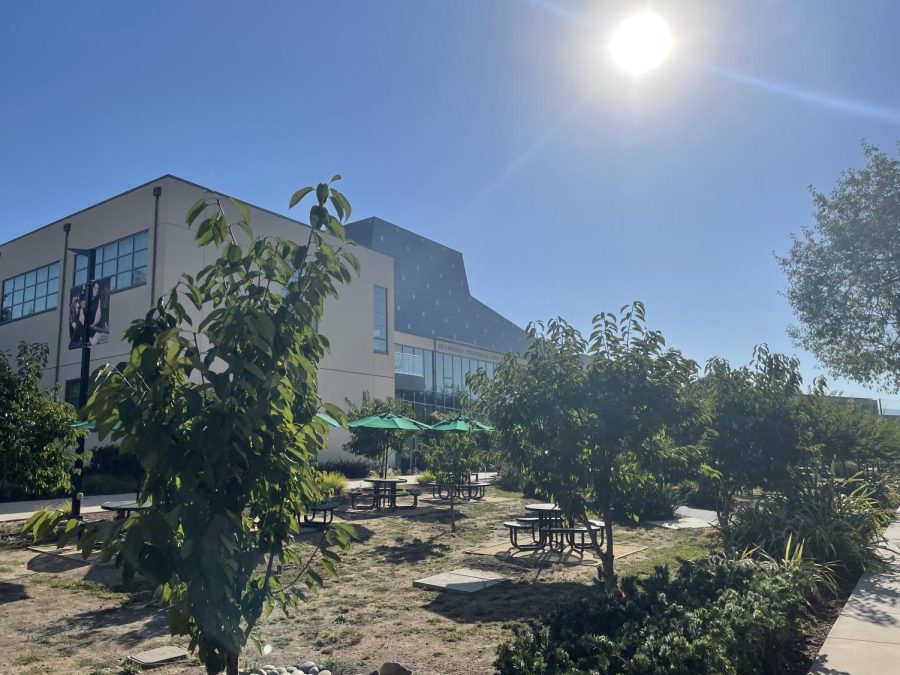Temperatures reach record highs in week-long heat wave, upper school cancels outdoor activities
The tables in the orchard sit deserted as students remain indoors to escape the heat on Tuesday afternoon, when temperatures reached over 100 degrees. A record-breaking heat wave on the West Coast raised temperatures to over 100 degrees Fahrenheit at the upper school campus, leading to the cancellation of outdoor activities this week.
A record-breaking heat wave on the West Coast raised temperatures to over 100 degrees Fahrenheit at the upper school campus, leading to the cancellation of outdoor activities this week.
As per school policy regarding high temperatures, outdoor sports activities, including cross country, golf and tennis practices, basketball pre-season workouts and certain P.E. options, did not take place over the past two days, according to athletic director Dan Molin. Football practice moved inside the gym, where they are sharing the facility with the girls volleyball team. In addition, the cross country team did not compete at the Firebird Invitational on Tuesday, which meet organizers canceled due to the heat. In an email sent to the parents Wednesday evening, upper school nurse Debra Nott announced that, with temperatures forecasted to exceed 100 degrees, this policy would continue for today.
“The athletes’ safety is our number one priority, so I’m glad we were able to practice what we preach in that respect by canceling practices today,” cross country head coach Kevin Oliver said. “When it gets to these extremes, triple digit temperatures, I do think it makes sense to avoid high levels of exertion entirely.”
As means of coping with the high temperatures, students have stayed inside air-conditioned buildings and avoided sunny areas on campus. Many students have chosen to eat lunch in indoor seating areas, such as in the auxiliary gym or Manzanita Hall, rather than outside in the heat.

“I’m very tired — every time I walk out, it’s not great,” Associated Student Body Vice President Gordon Chen (12) said. “Aux [is the best building to be in]. It’s really cool in there, and there’s the water supplies and everything. It’s great.”
The heat wave across California has set all-time high temperatures in some parts of the Bay Area; in San Jose, the high of 109 degrees on Tuesday broke the record for highest temperature last set in 2017. The National Weather Service has issued an excessive heat warning for the San Francisco Bay Area that will remain in effect until 8 p.m. today.
To stay safe and healthy in higher temperatures, the California Office of Emergency Services recommends avoiding direct sunlight, and, if possible, staying indoors. Hydration is also important, specifically, not just drinking water when feeling thirsty.
“Be sure your child has a full water bottle tomorrow morning and it would be a good idea to include some ice,” Nott said in an email sent out to all parents Monday evening. “No child should bring a jacket to school. All teachers and staff will be encouraging students to drink plenty of water and we have filtered water stations for refilling water bottles throughout the day.”
Some California residents have faced rolling blackouts over the past few days due to record-high strains on the electricity grid. For the duration of the heat wave, the California Independent System Operator recommends that households refrain from utilizing major appliances, turn off extraneous lights and set their thermostats at or above 78 degrees between the hours of 4 p.m. and 9 p.m., when the electricity grid is most highly strained.
The heat dome, the main cause of the heat wave, forms when a high pressure area traps air underneath it. The sun heats up the stagnant air, leading to increasing temperatures. While climate change may not have directly caused this particular heat dome, the frequency of these unprecedented and unpredictable weather conditions is increasing in part due to climate change.
The Weather Channel forecasts that temperatures will peak at 103 degrees Fahrenheit today at around 3 p.m. and 96 degrees Fahrenheit tomorrow. Temperatures will drop to around 80 degrees starting Saturday.

Felix Chen (11) is the co-news editor for Harker Aquila and the Winged Post, and this is his third year on staff. Felix hopes to diversify this year's...

Isabella Lo (12) is a Managing editor for Harker Aquila, and this is her fourth year on staff. This year, she looks forward to learning more about multimedia...

Emma Gao (12) is a co-managing editor for Harker Aquila, and this is her fourth year on staff. This year, she hopes to explore writing a variety of articles...


















![“[Building nerf blasters] became this outlet of creativity for me that hasn't been matched by anything else. The process [of] making a build complete to your desire is such a painstakingly difficult process, but I've had to learn from [the skills needed from] soldering to proper painting. There's so many different options for everything, if you think about it, it exists. The best part is [that] if it doesn't exist, you can build it yourself," Ishaan Parate said.](https://harkeraquila.com/wp-content/uploads/2022/08/DSC_8149-900x604.jpg)




![“When I came into high school, I was ready to be a follower. But DECA was a game changer for me. It helped me overcome my fear of public speaking, and it's played such a major role in who I've become today. To be able to successfully lead a chapter of 150 students, an officer team and be one of the upperclassmen I once really admired is something I'm [really] proud of,” Anvitha Tummala ('21) said.](https://harkeraquila.com/wp-content/uploads/2021/07/Screen-Shot-2021-07-25-at-9.50.05-AM-900x594.png)







![“I think getting up in the morning and having a sense of purpose [is exciting]. I think without a certain amount of drive, life is kind of obsolete and mundane, and I think having that every single day is what makes each day unique and kind of makes life exciting,” Neymika Jain (12) said.](https://harkeraquila.com/wp-content/uploads/2017/06/Screen-Shot-2017-06-03-at-4.54.16-PM.png)








![“My slogan is ‘slow feet, don’t eat, and I’m hungry.’ You need to run fast to get where you are–you aren't going to get those championships if you aren't fast,” Angel Cervantes (12) said. “I want to do well in school on my tests and in track and win championships for my team. I live by that, [and] I can do that anywhere: in the classroom or on the field.”](https://harkeraquila.com/wp-content/uploads/2018/06/DSC5146-900x601.jpg)
![“[Volleyball has] taught me how to fall correctly, and another thing it taught is that you don’t have to be the best at something to be good at it. If you just hit the ball in a smart way, then it still scores points and you’re good at it. You could be a background player and still make a much bigger impact on the team than you would think,” Anya Gert (’20) said.](https://harkeraquila.com/wp-content/uploads/2020/06/AnnaGert_JinTuan_HoHPhotoEdited-600x900.jpeg)

![“I'm not nearly there yet, but [my confidence has] definitely been getting better since I was pretty shy and timid coming into Harker my freshman year. I know that there's a lot of people that are really confident in what they do, and I really admire them. Everyone's so driven and that has really pushed me to kind of try to find my own place in high school and be more confident,” Alyssa Huang (’20) said.](https://harkeraquila.com/wp-content/uploads/2020/06/AlyssaHuang_EmilyChen_HoHPhoto-900x749.jpeg)



